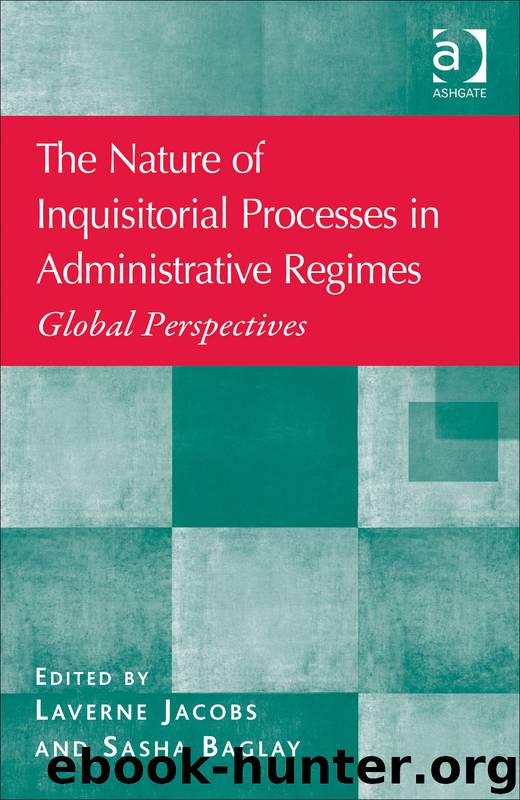The Nature of Inquisitorial Processes in Administrative Regimes by Laverne Jacobs & Sasha Baglay

Author:Laverne Jacobs & Sasha Baglay
Language: eng
Format: epub
Publisher: Ashgate
Published: 2013-06-13T16:00:00+00:00
PART 3
Truth Commissions and Public Inquiries I – Views of Commissioners
Chapter 10
Reflections on the Public Inquiry into Pediatric Forensic Pathology in Ontario
Justice Stephen T. Goudge
Introduction
The Inquiry into Pediatric Forensic Pathology in Ontario was established on April 25, 2007. It reported to the government of Ontario on October 1, 2008.1 In this chapter I will reflect on what happened in those 17 months to see what lessons there may be for the administrative tribunal community, particularly in balancing the objectives of efficiency and fairness. I will focus particularly on what we did that was more inquisitorial than the processes I am used to in my day job, in the sense that the Inquiry itself undertook initiatives to determine how matters would unfold.
It may be useful to begin with a brief description of what a public inquiry is, in the Canadian context. It is established by the executive branch of government through an order in council, passed pursuant to authorizing legislation. Its mandate is provided by that order in council. Its budget is set by the executive, and it reports to the executive. In a real sense, a public inquiry is a subordinate part of the executive branch of government. All provinces and the federal government have such legislation. Indeed, Ontario is in the process of bringing into effect new legislation which will enhance government’s power to exercise control over public inquiries.
Much use has been made of public inquiries over our history. Since Confederation, there have been more than 400 such inquiries at the federal level alone. Some have engaged solely in the formation of policy for government. For example, we owe our public broadcasting system, our health care system, and our free trade arrangement with the United States in large measure to public inquiries.
Typically however, governments establish public inquiries in response to significant public controversies about the propriety of government activity, or significant public concern about particular tragic events. In such circumstances, the inquiry will typically be asked to find facts and make policy recommendations to government in order that the public interest may be better served in future similar circumstances. In this sense, mine was a typical inquiry.
How did the Inquiry come about? It hardly need be said that the tragedy of a child who dies unexpectedly in criminally suspicious circumstances is a devastating event for parents, for family, and for the entire community. It is vital for society to deal with the tragedy in a way that is right and just, and that allows all those affected to come to terms with it. The criminal justice system is central to this task. It must seek to determine whether there is truth to the suspicion that the child was killed, and if so by whom.
The consequences of failure are extraordinarily high: wrongful conviction; perhaps years unnecessarily suffered in penitentiary; shattered families; stigmatizing labels like child killer; exhausted financial resources; and potentially, unidentified killers going unpunished, all at huge cost to public faith in the criminal justice system.
Forensic pathology is often vital in determining the success or failure of the system in dealing with these difficult cases.
Download
This site does not store any files on its server. We only index and link to content provided by other sites. Please contact the content providers to delete copyright contents if any and email us, we'll remove relevant links or contents immediately.
Objection! by Nancy Grace(1778)
Apeirogon by Colum McCann(1701)
Anatomy of Injustice by Raymond Bonner(1664)
That Every Man Be Armed by Stephen P. Halbrook(1578)
Civil Procedure (Aspen Casebooks) by Stephen C. Yeazell(1554)
The Vaccine Court by Rohde Wayne(1508)
Injustices by Ian Millhiser(1497)
Storytelling for Lawyers by Meyer Philip(1460)
A Practical Guide to International Arbitration in London by Hilary Heilbron(1434)
Restitution by Restitution(1424)
Coercing Virtue by Robert H. Bork(1357)
Broken Scales by Joel Cohen(1351)
Tangled Webs: How False Statements Are Undermining America: From Martha Stewart to Bernie Madoff by James B. Stewart(1336)
The Tools of Argument: How the Best Lawyers Think, Argue, and Win by Joel Trachtman(1316)
A Matter of Interpretation by Antonin Scalia(1310)
INDEFENSIBLE: One Lawyer's Journey Into the Inferno of American Justice by Feige David(1286)
American Tragedy by Lawrence Schiller & James Willwerth(1273)
A Religious Orgy in Tennessee by H.L. Mencken(1249)
Tangled Webs by James B. Stewart(1245)
